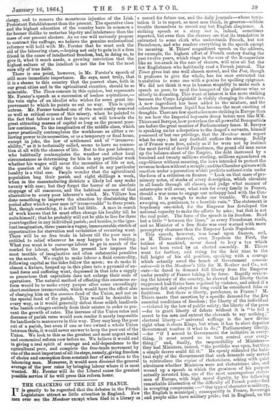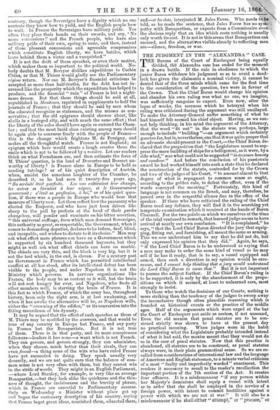THE CRICKING OF THE ICE IN FRANCE.
IT is greatly to be regretted that the debates in the French Legislature attract so little attention in England. Few men ever see the Afoniteur except when filed in a library as a record for future use, and the daily journals—whose temp- tation it is to report, as most men think, in grooves—seldom trouble themselves to record any but English eloquence. A. striking speech or a stray mot is, indeed, sometimes reported, but even then the chances are that its translation is entrusted to some clerk who understands French, but not Frenchmen, and who renders everything in the speech except its meaning. M. Thiers' magnificent speech on the address, for example, the highest effort of French oratory during the past twelve years, which rings in the ears of the Bonapartists like an ice-crack in the ears of skaters, will miss all but the few 'Englishmen who habitually read a French journal. The Times gives but one well chosen morsel, and the Post, though it professes to give the whole, has for once entrusted the translation to some one with a genius for spoiling epigrams. We did not think it was in human stupidity to make such a speech so poor, to spoil the bouquet of the glorious wine so utterly in decanting. This want of interest is the more striking because the Corps Legislatif is visibly changing its character. A. new ingredient has been added to the mixture, and the colourless flavourless liquid has become the most exciting of draughts. There are few spectaelesmore striking in Europe than to see how the Imperial bayonets droop before men like MM. Thiers and Berryer, how powerless the all-powerful Bonapartists are before the great masters of Parliamentary fence. M. Berryer is speaking under a despotism to the despot's servants, himself possessed of but one privilege, that the Moniteur must report what he says ; but any foothold suffices the strong. Boldly as if France were free, calmly as if he were not by instinct the most fervid of fervid Frenchmen, the grand old man sums up the balance-sheet of the Empire, the debt increased by a hundred and twenty millions sterling, millions squandered on expeditions without meaning, the laws intended to protect the revenue broken without a scruple; and the Chamber quivers with emotion under a peroration which predicts national ruin under the form of a criticism on finance. " Look on that mass of pro- missory notes, of stocks of every description, which circulate in all hands through all classes, and judge what manner of catastrophe will occur, what ruin for every family in France, should a war come to engage our unhappy land with the Con- tinent. It is enough to make one tremble. We shall be sweeping on, gentlemen, to a horrible ruin." The statement is hopelessly one-sided, for the Emperor has developed the national capacity to make the efforts he asks ; but that is not the real point. The force of the speech is its freedom. Read but a little " between the lines," as every Frenchman reads, and no Minister of a free State was ever warned with more peremptory clearness than the Emperor Louis Napoleon.
This speech, however, was based upon finance, and, as M. Thiers observed, even Napoleon the First, the boldest of mankind, never dared to levy a tax which had not been voted by an elected assembly. M. Thiers went far further, and rising for the first time to the full height of his old position, speaking with a courage which actually awed the bench of Government commis- saires—it is the Afoniteur's title for M. Rouher and Co., not ours—he dared to demand full liberty from the Emperor under penalty of France taking it by force. Rapidly review- ing the history of the country, he showed that liberty thrice suppressed had thrice been regained by violence, and asked if a necessity felt and obeyed so long could be considered false or factitious. But there is liberty, perchance, in France ? M. Thiers meets that assertion by a specific demand for the live essential conditions of freedom; the liberty of the individual —violated by the law of public safety; the liberty of the press —for to grant liberty of debate without it is " to tell a secret to ten men and entreat the eleventh to say nothing ;" electoral liberty—" universal suffrage is the new divine right when it elects Kings, but when it has to elect deputies Government teaches it what to do ;" Parliamentary liberty, —for "if I accord to Government the initiative in every- thing, it must accord us in turn control over every- thing ;" and, finally, the responsibility of Ministers— they had Ministers, indeed, "the portfolio was open, but then a simple decree could fill it." He openly ridiculed the habi- tual reply of the Government that such demands only served to reintroduce the regime of rhetoricians, asking with quiet adroitness whether Ministers were not rhetoricians also, and wound up a speech in which the greatness of his purpose actually invested him, one of the most unscrupulous states- men of Europe, with high moral dignity, by the following remarkable illustration of the difficulty all French parties find in accepting compromise :—" Our type of character is military, the English is municipal ; consequently in France, Sovereign and people alike have military pride; but in England, on the contrary, though the Sovereigns have a dignity which no one contests they know how to yield, and the English people how to wait. In France the Sovereigns have military pride. Too often they place their hands on their swords, and cry, No more concessions !' and the French people, who have also military pride of their own, spring to arms, and then, instead of those pleasant concessions and agreeable compromises which constitute English liberty, we have battles, which leave behind them a victor and a vanquished." It is not the drift of these speeches, or even their matter, which makes them so important to the political world. No- body doubts that M. Berryer dislikes expeditions to Cochin China, or that M. Thiers would gladly see the Parliamentary regime return. Nor can M. Berryer's financial criticisms be accepted as more than half-truths, for the debt has not in- creased like the prosperity which the expenditure has helped to produce, and the financial " ruin" of France is but a night- mare dream. But that these things should be said at all, republished in Moniteurs, reprinted in supplements to half the journals of France ; that they should be said by men whom the educated recognize as statesmen, and the masses as con- servative ; that the old epigrams should shower about, like shells in a besieged city, and with much the same effect ; that the liberty of the salon should have again re-entered the Cham- ber ; and that the most lucid class existing among men should be again able to converse freely with the people of France— this is the change which frightens M. de Persigny, and makes all the thoughtful watch. France is not England ; an epigram which here would create a laugh creates there the smile which is apt to be followed by a resolve. Let our readers think on what Frenchmen are, and then estimate the force of M. Thiers' question, is the land of Descartes and Bossuet un- worthy of liberty ? is France alone in Europe to be held as needing tutelage? or of his quiet description of Austria, when, amidst the conscious laughter of the Chamber, he described it, as he had seen it twenty-five years ago, "Sa serinite flail parfaite. Lee uns cultivaient leer champs, lee wares se livraient d leer nigoce, et le Gouvernement gouvernait ; c' !tali sa profession, a ha," or of his quiet ques- tion, if there was a people in Europe who would bear that measure of liberty now. Let them reflect how the peasantry who elected the Emperor, and who have just been driven like sheep to the poll by prefects at the head of their garde,' champetres, will ponder and ruminate on his bitter assertion, "this universal suffrage, from which men demand Sovereigns, this authority so great, so respectable, the Government, when it comes to demanding deputies, declares to be infirm, deaf, blind, and incapable, and wishes to dictate to it its choice." Men may ask what effect mere phrases can have on a Government which is supported by six hundred thousand bayonets, but they might as well ask what effect chisels can have on marble. The chisels are very thin, and the block is very big, but it is not the tool which, in the end, is cloven. For a century past no Government in France which has permitted intellectual conflict at all has stood, after its intellectual defeat has been visible to the people, and under Napoleon it is not the Ministry which governs. In nervous organizations like France, the body may be as content as it will, but the brain will not rest hungry for ever, and Napoleon, who feeds all other members well, is starving the brain of France. It is this fact to which France, of which the army has, throughout history, been only the right arm, is at last awakening, and when it has awoke the alternative will be, as Napoleon wills, either the " crowning of the edifice," or its conversion into the fitting mausoleum of his dynasty.
It may be argued that the effect of such speeches as those of M. Thiers may be modified by the answers, and that would be true of any country in Europe but France, and any party in France but the Bonapartists. Bat it is not true of them. There is in that party, and its more conspicuous followers—leaders it has none—a want which is not French. They can govern, and govern strongly, they can administer, when they choose, much better than their rivals, they can even found—a thing none of the wits who have ruled France have yet succeeded in doing. They speak usually very decently, and we are not quite sure that the balance of com- mon sense is not very often with them, but they cannot win in the strife of words. They might in an English Parliament, —where Lord Stanley, for example, is very like an average Bonapartist,—but they lack alike the quickness and the thin- ness of thought, the incisiveness and the brevity of phrase, which in France are essential to Parliamentary success. Only on Wednesday a Minister without place got up and began the customary description of his country, saying that France begat great ideas, nourished them, educated them, and—et lee dote, interjected M. Jules Fevre. Who needs told, as he reads the sentence, that Jules Fevre has no sy pathy with Bonapartism, or expects from a Commissaire eve the obvious reply that an idea which costs nothing is usually only worth its cost. It is not in this arena that Bonapartism can succeed, and the alternatives visible already to reflecting men are—silence, freedom, or war.































 Previous page
Previous page